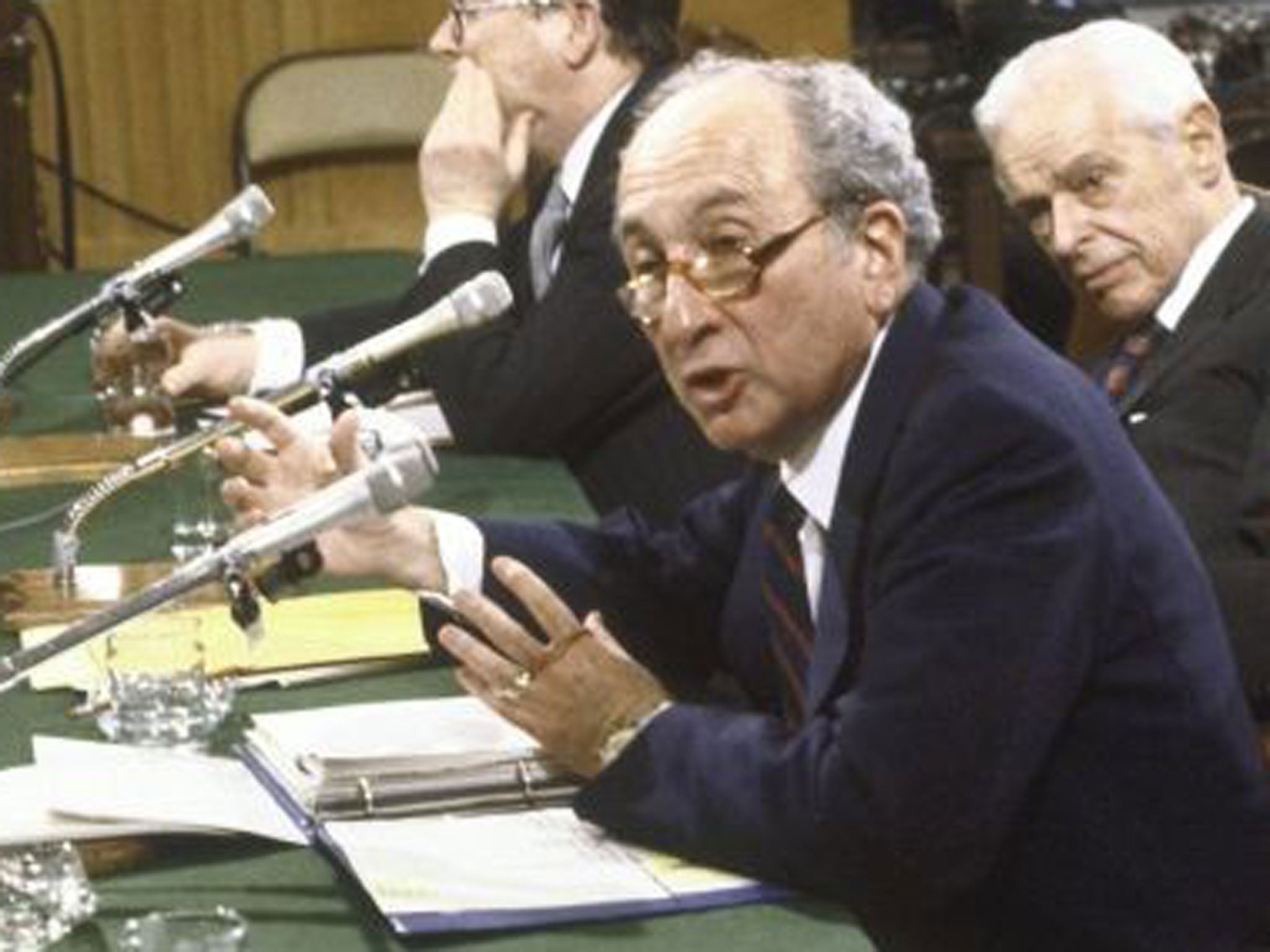Max M Kampelman: Diplomat who negotiated with the Soviet Union on nuclear arms reduction
He worked for Republicans and Democrats at the same time – a situation now unthinkable

Nothing delighted Max Kampelman more than the description of him once offered by Izvestia. He was, according to the former Soviet newspaper, “a friend of animals and an enemy of Communists”. The first part referred to his stint as chairman of the Friends of the National Zoo in Washington DC, the second to his years of service as a leading US negotiator on human rights and arms control. Given the source, it was high praise indeed.
Kampelman was among the last of a breed made famous by the likes of Paul Nitze, Clark Clifford and Lloyd Cutler – Washington “wise men” who advised presidents and undertook vital tasks for them, but who were never elected to any public office. In Kampelman's case, the presidents came from both parties.
He himself was a lifelong Democrat, named by Jimmy Carter to lead the US team with the daunting task of seeking Soviet compliance with the 1975 Helsinki accords. But, impressed by Kampelman's patient and hard-headed negotiating style, Ronald Reagan not only kept him on in that job after Carter's defeat, but in 1985 placed him in charge of the US delegation to the superpower nuclear arms talks in Geneva that would yield arguably the two most important arms reductions deals of the late Cold War era.
Such was the trust that Kampelman inspired among Democrats and Republicans alike that at one point in 1984 he was simultaneously a leading foreign policy adviser to Walter Mondale, the Democratic presidential nominee, and a legal counsel to Edwin Meese III, attorney general during Reagan's second term. In today's hyper-partisan Washington, a similar arrangement is all but unthinkable.
Max Kampelman was born in New York, the son of Jewish immigrants from Romania. A conscientious objector during the Second World War, he did alternate service by taking part in a government study of starvation. In the process his weight fell to barely 100lbs, less than eight stone, but the findings would be of great value in treating survivors of the Nazi camps.
After taking his law degree at New York University, Kampelman moved to Minneapolis, where he took a masters and then a doctorate in political science at the University of Minnesota. More significantly he got a first taste of public service, working for Hubert Humphrey, then the Democratic mayor of Minneapolis.
When Humphrey was elected to the Senate in 1948, Kampelman followed him to Washington, serving as Humphrey's legislative counsel until 1955, before joining the Washington office of the law firm of Fried, Frank, Harris, Shriver, & Jacobson. But the two men stayed close, and Kampelman would advise Humphrey in his unsuccessful presidential campaigns of 1968 and 1972.
By then his world views were hardening. As early as 1955 Kampelman had renounced pacifism, in part because of the menace of nuclear weapons, and for several years served as a reservist in the US Marine Corps. In the mid-1970s he moved away from the McGovernite left-wingers who controlled the Democratic party, joining the Committee on the Present Danger, a foreign policy ginger group then focussed on the Soviet Union, but which later would be a platform for advocates of the neo-conservative foreign policy of George W Bush.
Kampelman was no expert on nuclear arms when Reagan named him to the Geneva job. But his four years in charge of the US delegation were highly fruitful – even though they began with what seemed an epic failure: the 1986 summit in Reykjavik, when presidents Reagan and Gorbachev came within touching distance of agreement to get rid of all nuclear weapons. The deal foundered on Reagan's refusal to give up his cherished “Star Wars” programme. A reporter recalled Kampelman being almost in tears at the post-summit press conference.
In fact Reykjavik ushered in a golden era of arms control. In December 1987 the two leaders signed the INF Treaty, eliminating medium range nuclear weapons. Much progress was also made towards agreement on cutting the two sides' strategic arsenals, a deal formalised in the START I treaty of 1991, two years after Kampelman had left Geneva to return to his Washington law practice.
By the end even the Russians respected his toughness and fairness as a negotiator. “Never be unreasonable,” Kampelman once told The Washington Post. “But if you give at the start, you are losing out... Don't look to show good will by making a concession, because it is interpreted not as good will but as a lack of will.”
In 1989 he received the Presidential Citizens Medal, the country's second highest civilian award, and in 1999 went one better when Bill Clinton awarded him the Presidential Medal of Freedom, the highest civilian honour of all. By the end, he was among the fiercest foes of the nuclear weapons that had occupied much of his professional life. Horrified by what would happened had the September 2001 terrorists possessed a nuclear device, Kampelman organised efforts to enact a worldwide ban on nuclear weapons, a campaign in vain, but featuring such luminaries as former Secretaries of State Henry Kissinger and George Shultz.
Max M Kampelman, lawyer and diplomat: born New York City 7 November 1920; married 1949 Marjorie Buetow (deceased 2007; two sons, three daughters); died Washington DC 25 January 2013.
Subscribe to Independent Premium to bookmark this article
Want to bookmark your favourite articles and stories to read or reference later? Start your Independent Premium subscription today.

Join our commenting forum
Join thought-provoking conversations, follow other Independent readers and see their replies